Religious affiliation is just one of several factors linked with religious knowledge. The survey shows, for example, that religious knowledge is also very closely linked with how many years of schooling a person has received. In addition, a variety of other educational traits – such as making efforts to learn about one’s own religion or other religions, or taking a class about world religions – help to explain differences in religious knowledge.
Another key factor linked to religious knowledge is knowing people who belong to different religious groups: Americans with more religiously diverse social circles tend to know more about religion.
Demographic characteristics also are associated with religious knowledge. Men perform better on the survey than women, whites do better than blacks and Hispanics, and older people score higher than younger people.
This chapter examines differences in knowledge about religion first by education and then by other demographic traits and social connectedness.
More education is linked with more religious knowledge
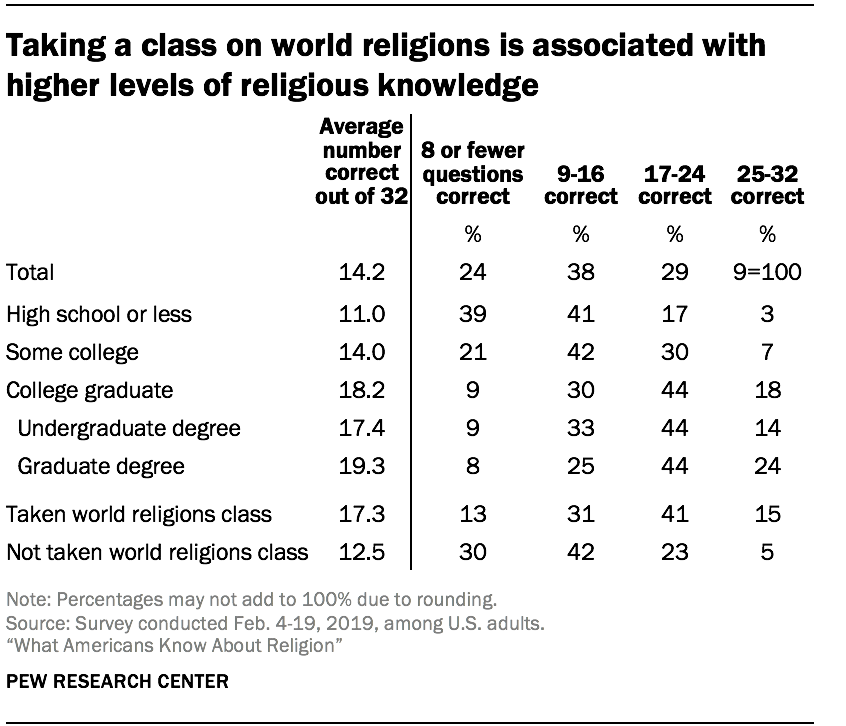
People with higher levels of education tend to be more knowledgeable about religion. College graduates get an average of 18.2 out of 32 religious knowledge questions right, including 18% who answer 25 or more correctly. Within this group, people who have a postgraduate degree do especially well, averaging 19.3 out of 32 questions correct, including one-quarter who answer at least 25 questions right (24%).
Scores are lower among respondents with less education. Among people who have some college experience, the average number of correct answers is 14.0. Those who have a high school diploma or less education get 11.0 questions right, on average.
Americans who have taken a class about world religions (in high school or college, for example) answer 17.3 questions right, on average, compared with 12.5 among those who have not taken such a class. Most people who have taken a world religions class (57%) correctly answer more than half of the religious knowledge questions, while just 28% of those who have not taken a world religions class do as well.
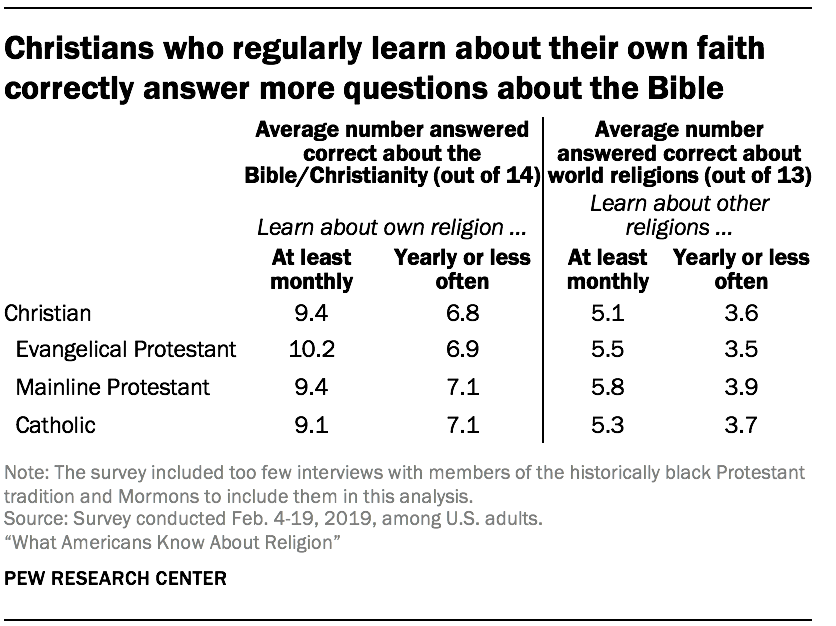
The survey included several other questions that explore how Americans may have learned what they know about religion. Christians who say they regularly engage with material about their own faith – be it scripture, websites, podcasts, books, magazines or television – correctly answer more questions about the Bible and Christianity than those who do this less often (9.4 out of 14, on average, vs. 6.8). Similarly, evangelical Protestants who do things to learn about their religion at least once a month give right answers to roughly three more questions about the Bible and Christianity, on average, than other evangelical Protestants do (10.2 vs. 6.9).
And Christians who spend time learning about religions besides their own at least once a month tend to know more about world religions than do Christians who engage with material about other religions less often.
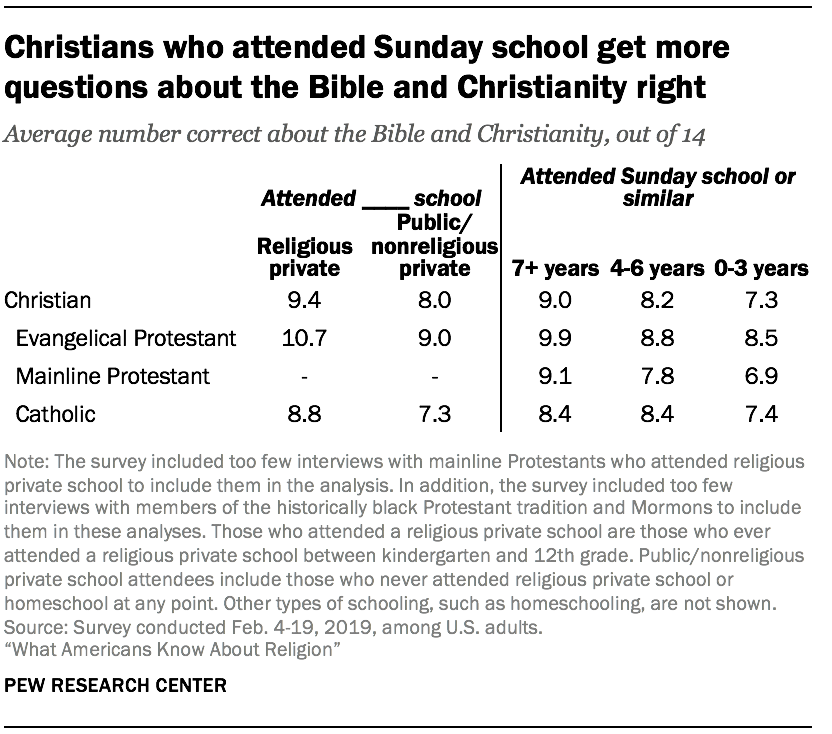
The survey also asked respondents what kind of schools they attended during their childhood. Christians who went to religious private schools tend to get more questions right about the Bible and Christianity than do those who went to either public schools or nonreligious private schools (9.4 vs. 8.0). Additionally, Christians who attended more years of Sunday school, CCD or some other form of religious education generally answer more questions about the Bible and Christianity correctly. For example, Christians who attended Sunday school or a similar program for at least seven years correctly answer an average of 9.0 of the 14 questions about Christianity and the Bible, while those who attended for three or fewer years get 7.3 questions right, on average.
Those who say they know ‘a lot’ about many religions answer more knowledge questions correctly
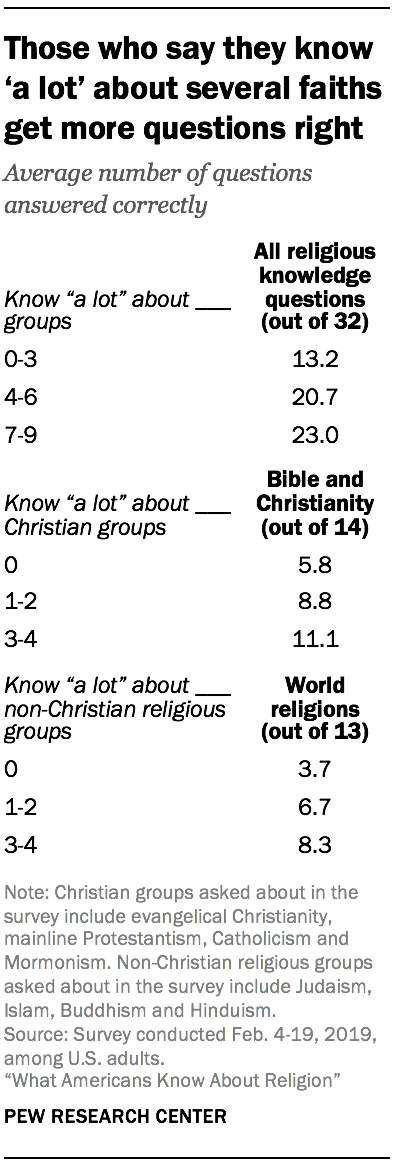
The survey sought to explore whether respondents who say they know a lot about religion actually get more religious knowledge questions right. It included a battery of questions asking respondents how much they personally know about evangelical Christianity, Catholicism, Mormonism, Judaism, Islam, atheism, Buddhism, Hinduism and mainline Protestantism – “a lot,” “some,” “not much” or “nothing at all.” The survey shows that knowing “a lot” about many religions is associated with answering more questions right about the Bible and Christianity and world religions, as well as getting more religious knowledge questions right overall – even after religious affiliation and other demographic characteristics are taken into account.
For example, those who say they know a lot about evangelical Christianity, mainline Protestantism, Catholicism and Mormonism correctly answer more questions about the Bible and Christianity than those who do not know a lot about these religions. Those who say they know a lot about at least three of these religions correctly answer an average of 11.1 out of 14 questions about the Bible and Christianity. By comparison, those who do not know “a lot” about any of these four religions get 5.8 of the 14 questions right, on average.
The same is true for those who say they know a lot about Judaism, Islam, Buddhism and Hinduism. Those who say they know a lot about three or more of these groups correctly answer 8.3 out of 13 questions about world religions. However, those who do not know “a lot” about Judaism, Islam, Buddhism or Hinduism answer 3.7 questions right, on average.
Overall, those who say they know a lot about at least seven of the groups correctly answer 23.0 of the 32 religious knowledge questions, on average. By comparison, those who say they know “a lot” about three or fewer groups get an average of 13.2 questions right.
Young adults display lower levels of religious knowledge
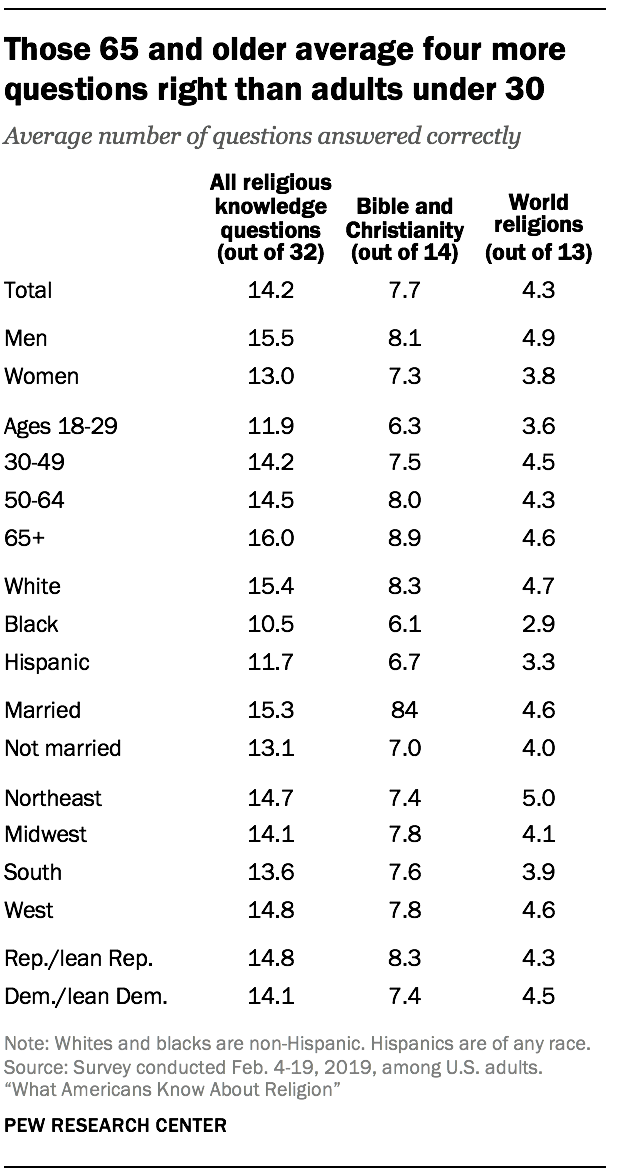
Gender, race and ethnicity, age, and marital status also are associated with differing levels of religious knowledge. For instance, Americans ages 65 and older correctly answer 16.0 questions, on average, while adults under 30 get fewer questions right (11.9). And whites get an average of 15.4 questions right, compared with 10.5 among black adults and 11.7 among Hispanics.
Politically, Republicans and those who lean toward the Republican Party (14.8 questions right, on average) score slightly higher than Democrats and Democratic leaners (14.1). This is mainly because Republicans do slightly better than Democrats on the survey’s questions about Christianity and the Bible (8.3 right, on average, among Republicans vs. 7.4 among Democrats). However, differences in levels of religious knowledge by party identification disappear after controlling for other factors more closely associated with religious knowledge (see Chapter 3).
Similarly, while people living in the West (14.8) and Northeast (14.7) score higher, on average, than those who live in the South (13.6), these differences also disappear after controlling for other factors.
Americans with religiously diverse social networks answer more religious knowledge questions correctly
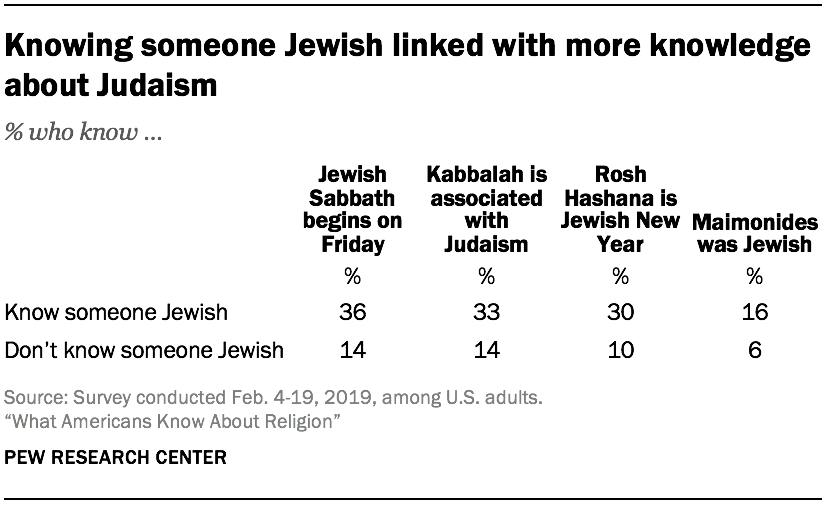
The survey included a set of questions that asked respondents whether they personally know someone who is an evangelical Christian, Catholic, Mormon, Jewish, Muslim, atheist, Buddhist, Hindu or mainline Protestant. Across the board, knowing someone who identifies with one of these religions is correlated with knowing more about that religion.
For instance, Americans who say they know a Jewish person are at least twice as likely as those who do not know anyone who is Jewish to answer the survey’s questions about Judaism correctly. For example, more than one-third of those who know someone who is Jewish correctly answer that the Jewish Sabbath begins on Friday (36%), while only 14% of those who do not know someone who is Jewish get this question right.
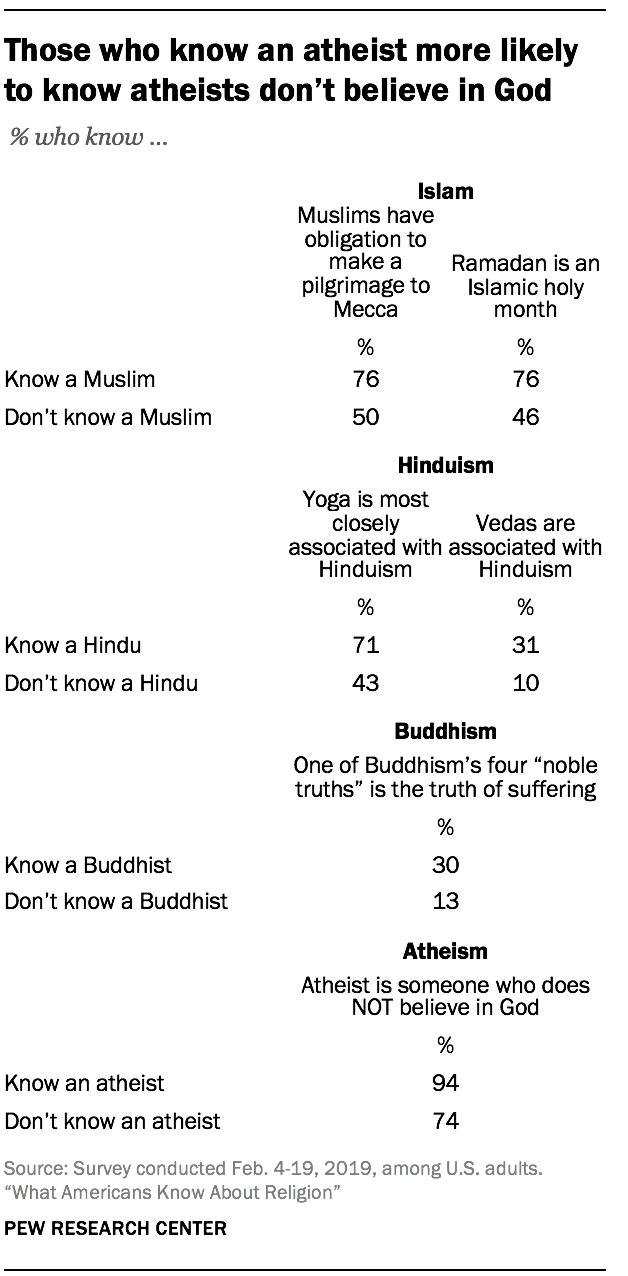
Similarly, three-quarters of people who know a Muslim correctly identify Mecca as the holy city to which Muslims make a required pilgrimage (76%), and a similar share know that Ramadan is an Islamic holy month (76%). Fewer people who do not know someone who is Muslim know that Mecca is Islam’s holiest city (50%) or that Ramadan is an Islamic holy month (46%).
Similar patterns exist when it comes to knowing someone who is Hindu, Buddhist or atheist, and correctly answering questions about these topics.
Overall, people who have the most religiously diverse social networks tend to answer more religious knowledge questions correctly. For instance, those who say they know people from at least seven of the nine religious groups asked about in the survey answer 19.0 questions right, on average. By comparison, those who know someone from four to six of the religious groups get 14.5 right, and respondents who know someone from three or fewer religious groups answer an average of 8.6 questions correctly.
Churchgoing Christians tend to have more knowledge of the Bible and Christianity
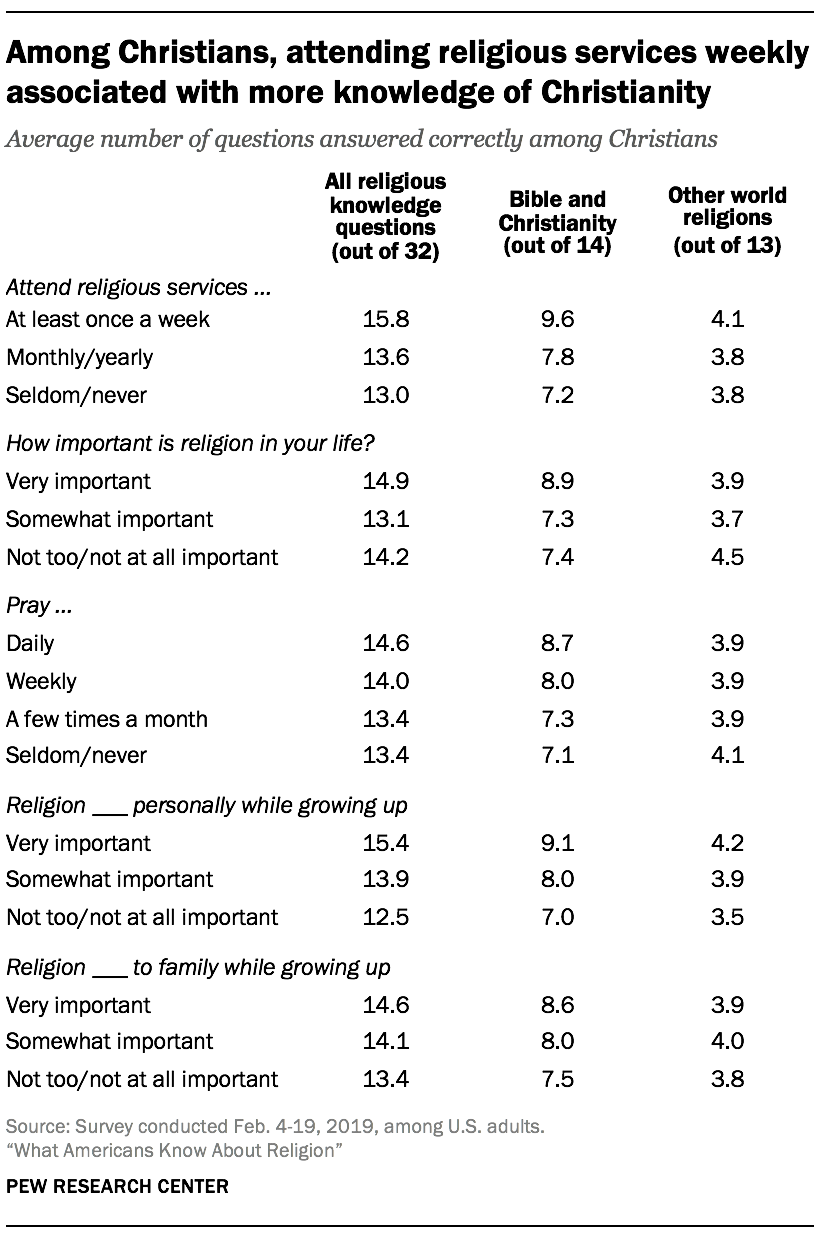
Does being highly engaged in one’s own religion increase overall levels of religious knowledge? For Christians, the answer appears to be yes.
The survey asked respondents several questions about religious commitment, including how often they attend religious services, how important religion is in their lives, and how often they pray. Christians who are religiously observant (that is, those who attend religious services at least weekly, pray daily, or say religion is very important in their lives) earn higher scores on the survey’s questions about the Bible and Christianity than Christians who do these things less often.
But on questions related to other world religions, the relationship between religious commitment and religious knowledge is less clear. For example, Christians who say religion was very important to them when they were growing up correctly answer more questions about world religions (Judaism, Islam, Buddhism, Hinduism and Sikhism) than Christians who say religion was not too or not at all important to them as children (4.2 vs. 3.5, on average). And Christians who attend religious services most regularly correctly answer slightly more questions about world religions, on average, than do Christians who seldom or never attend religious services (4.1 and 3.8, respectively). But Christians who say religion is “very important” in their lives correctly answer fewer questions about world religions than Christians who say religion is “not too” or “not at all” important to them.
The survey included too few interviews with members of non-Christian faiths (Jews, Muslims, Buddhists, Hindus and others) to permit analysis of whether their levels of involvement with their respective faiths are correlated with religious knowledge.




